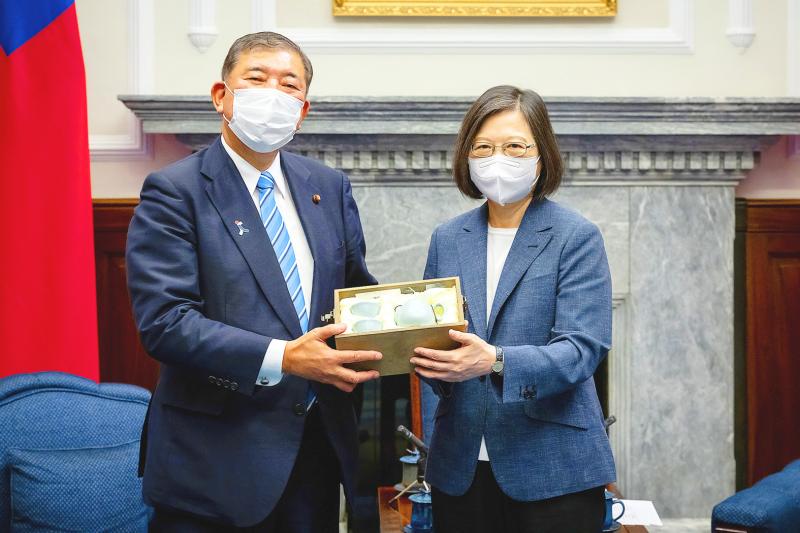President Tsai Ing-wen (蔡英文) yesterday told a visiting Japanese parliamentarian delegation that Taiwan looks forward to working with Tokyo on efforts to maintain the stability of the Indo-Pacific region.
In livestreamed remarks made ahead of a closed-door meeting with the delegation led by former Japanese minister of defense Shigeru Ishiba, Tsai said Taiwan would work with Japan and other democratic partners to contribute to the peace and stability of the region.
The security of Taiwan is important not only in terms of protecting the nation’s sovereignty, but also the defensively strategic “first island chain,” she said.

Photo: AP / Presidential Office
Ishiba, who arrived in Taiwan on Wednesday, said his four-day trip is aimed at fostering exchanges with Taiwanese officials on how the two nations should collaborate on security matters.
“We need to think ahead about what kind of situations could happen, what kind of laws and agreements we should prepare, and what kind of armaments we could use,” he said in prepared remarks. “We need to work together to reach consensus on this ahead of anything that could happen.”
Ishiba said that Japan is also working closely with the US to prevent conflict in the Indo-Pacific region, adding that the defense allies “had no choice” but to prepare.
The four-member delegation includes another former Japanese minister of defense, Yasukazu Hamada, as well as former deputy minister of defense Akihisa Nakashima and Takayuki Shimizu.
Taiwan said all four delegates are members of a Japanese parliamentarian association on security issues founded by Ishiba and Hamada in November 2019.
Ishiba, who served as defense minister from 2007 to 2008, said that Japan had responsibility for the stability of the Asia-Pacific region and that it was an issue that former Japanese prime minister Shinzo Abe had paid special attention to.
It was regrettable that the Abe — who died on July 8 — was unable to continue his work, Ishiba said, adding that he wished to carry on what was left unfinished by Abe and actively work on regional security affairs.
Additional reporting by AP

A magnitude 5.6 earthquake struck off the coast of Yilan County at 12:37pm today, with clear shaking felt across much of northern Taiwan. There were no immediate reports of damage. The epicenter of the quake was 16.9km east-southeast of Yilan County Hall offshore at a depth of 66.8km, Central Weather Administration (CWA) data showed. The maximum intensity registered at a 4 in Yilan County’s Nanao Township (南澳) on Taiwan’s seven-tier scale. Other parts of Yilan, as well as certain areas of Hualien County, Taipei, New Taipei City, Taoyuan, Hsinchu County, Taichung and Miaoli County, recorded intensities of 3. Residents of Yilan County and Taipei received

Taiwan has secured another breakthrough in fruit exports, with jujubes, dragon fruit and lychees approved for shipment to the EU, the Ministry of Agriculture said yesterday. The Animal and Plant Health Inspection Agency on Thursday received formal notification of the approval from the EU, the ministry said, adding that the decision was expected to expand Taiwanese fruit producers’ access to high-end European markets. Taiwan exported 126 tonnes of lychees last year, valued at US$1.48 million, with Japan accounting for 102 tonnes. Other export destinations included New Zealand, Hong Kong, the US and Australia, ministry data showed. Jujube exports totaled 103 tonnes, valued at

TRUST: The KMT said it respected the US’ timing and considerations, and hoped it would continue to honor its commitments to helping Taiwan bolster its defenses and deterrence US President Donald Trump is delaying a multibillion-dollar arms sale to Taiwan to ensure his visit to Beijing is successful, a New York Times report said. The weapons sales package has stalled in the US Department of State, the report said, citing US officials it did not identify. The White House has told agencies not to push forward ahead of Trump’s meeting with Chinese President Xi Jinping (習近平), it said. The two last month held a phone call to discuss trade and geopolitical flashpoints ahead of the summit. Xi raised the Taiwan issue and urged the US to handle arms sales to

BIG SPENDERS: Foreign investors bought the most Taiwan equities since 2005, signaling confidence that an AI boom would continue to benefit chipmakers Taiwan Semiconductor Manufacturing Co’s (TSMC, 台積電) market capitalization swelled to US$2 trillion for the first time following a 4.25 percent rally in its American depositary receipts (ADR) overnight, putting the world’s biggest contract chipmaker sixth on the list of the world’s biggest companies by market capitalization, just behind Amazon.com Inc. The site CompaniesMarketcap.com ranked TSMC ahead of Saudi Aramco and Meta Platforms Inc. The Taiwanese company’s ADRs on Tuesday surged to US$385.75 on the New York Stock Exchange, as strong demand for artificial intelligence (AI) applications led to chip supply constraints and boost revenue growth to record-breaking levels. Each TSMC ADR represents